
Volunteers and organizers write letters to detained LGBTQ+ migrants at the Mariposas Sin Fronteras house in Tucson, Arizona, on Sunday, May 25, 2025. Violeta Dominguez (center) said the letters are a way to strengthen connections between migrants and allies, something that is especially needed as there has been an increase in attacks on both immigrant and trans communities lately.
On a recent Sunday afternoon, Joselin Mendez sat on a lawn chair writing to one of several detained LGBTQ+ migrants. Her pink gel pen danced over the lined sheet of paper effortlessly as she focused on the message she wanted to deliver.
Not being the first time she does this, in her letters, Mendez consistently encourages people in detention to remain brave and hold onto hope.
She knows firsthand how lonely it can feel to be detained at an immigration center. In 2017, after making the harrowing journey from Nicaragua to the U.S., Mendez turned herself in to U.S. Customs and Border Patrol agents and applied for asylum. She was held in a detention center in Cibola County, New Mexico, for seven months.
When Mendez showed signs that she was struggling with mental health, she said she was placed in isolation for about a month. She was allowed two showers once a week and a few minutes of sunshine twice a week. Otherwise, she was in a cell with a bed and a toilet. To keep track of passing time, she tallied the days with a pencil, one line each time she was given breakfast.
Guards at the detention center would tell her she has no voice and that she’s worthless, Mendez recalled.
“It’s hard in there,” Mendez shared in Spanish. “It’s one of the most horrible things.”
What helped Mendez was knowing she had a community supporting her. That support came in the form of letters from Mariposas Sin Fronteras.
“I felt like I had nothing. I didn’t have a family. And when the organization sent us letters we felt like we had value as humans and that we weren’t alone,” Mendez said. “And now that I’m on this side, my goal is always to support whenever I can, to go visit people in detention because sometimes just a hug, just telling someone, ‘everything will be OK, stay calm, échale ganas’ (give it your all)’, people feel encouraged.”
Every month, Mariposas Sin Fronteras, a Tucson nonprofit mutual aid organization that supports LGBTQ+ migrants during and after their detention, hosts an event where organizers and volunteers meet to write letters to those in detention. In the letters, they tell migrants they’re not alone and have a community that wants to support and help them.
Mendez and Lizbeth Oquita, both co-organizers of social programs for Mariposas, host the letter-writing event usually on the second Sunday of the month. Their hope is that the same volunteers will show up each month, allowing them to build trusting relationships with the migrants and learn more ways to support them.
Mariposas Sin Fronteras started as a grassroots organization in 2011 and became a nonprofit in 2017. The organization, which is also led by LGBTQ+ migrants, aims to support and empower the LGBTQ+ migrant community.
They have been writing letters since the organization started, Oquita said.
It’s one of many ways they show consistent support for migrants in Arizona and across the U.S. as they navigate their immigration cases. The organization also supports migrants by attending their hearings, visiting them in detention, providing commissary funds or paying their bail, writing letters of support and helping with basic necessities like food, clothes or emergency funds once they’re released.

Lizbeth Oquite (left) and Joselin Mendez, co-organizers of social programs for Mariposas Sin Fronteras, play Millenial/Gen-Z Loteria with volunteers as they write letters to detained LGBTQ+ migrants in Tucson, Arizona, on Sunday, May 25, 2025.
Showing up for migrants helps their court case
Before volunteers arrived, Mendez sprayed down the front yard with a green garden hose. The damp dirt, paired with the occasional breeze, helped cool down the 94-degree afternoon.
Oquita and their spouse, Chuy Oquita, set up two folding tables to create one long, narrow table surrounded by folding chairs.
Instrumental Latin music by Hermanos Gutierrez and other Latinx artists played from a Bluetooth speaker. Birds perched on nearby power lines chirped and sang, adding to the music.
Gradually, the chairs were filled with almost a dozen people — some first timers and others who had written a letter or two before, or had worked with Mariposas at other events.
Oquita provided them with a list of 19 migrants and instructions on how to address the letters. They also gave volunteers an overview of what they can say, the goal of the letters and how, over time, the volunteer can maintain contact with the same migrant, asking about upcoming court dates where supporters can show up.
The support Mariposas and its volunteers provide can make all the difference whether a person is deported or released into the community to fight their case from outside a detention center, Oquita and Mendez said.
“Just recently, we had somebody be released, and what the judge said was because they saw people sitting (in the courtroom). The judge was like, ‘I know that this person has support because these people showed up today,’” Oquita told volunteers. “And so, when we can have people show up in that way, it will help. It will help greatly.”

Joselin Mendez hoses down the front yard of the Mariposas Sin Fronteras home in Tucson, Arizona, as she helps organizers set up for a monthly event where volunteers write letters to detained LGBTQ+ migrants.
‘We are seeing more fear, more anxiety, more depression’
Oquita said they’re seeing an increase in the need for commissary funds. People have reported getting two meals a day instead of three and having to buy food if they’re hungry. President Donald Trump and his administration’s anti-immigrant rhetoric have also empowered detention center employees to be more racist and mistreat migrants, Oquita said.
“We are seeing more fear, more anxiety, more depression because people are losing faith,” Oquita said. “Because we’re seeing the system is becoming more and more violent against the community and more people are feeling that and feeling more isolated because they see the hate toward the immigrant community.”
Joselin plans to visit a young man at the detention center in Eloy, Arizona, soon, with whom she has been writing back and forth. He’s attempted suicide three times, she said, but immigration won’t connect him with a psychologist. Instead, they’ve placed him in isolation three times and wouldn’t allow him any visitors until recently.
“People who go through isolation have to survive,” Mendez said. “When they’re released, they’re released with trauma.”
‘Connection is the source of our strength and power’
Violeta Dominguez has collaborated with Mariposas sin Fronteras as a member of the Colectivo de Familias Arcoiris, part of the Coalicion de Derechos Humanos. Sunday was her first time joining the group writing letters to migrants.
Dominguez wrote a letter to a trans woman from Mexico. In her letter, she wished the woman a lot of strength and reassured her that she’s not alone, Dominguez said.
“I think the feeling of isolation, it's a really horrible one,” she said. “And it's really important that people know that there's a community out here, and even if we cannot physically provide that support, that hopefully they feel that connection, that they know that they belong.”
Dominguez said strengthening connections and being in solidarity with immigrants and with trans folks is especially important now as there have been increased attacks on both groups.
“I very strongly believe that in that connection is the source of our strength and power,” Dominguez said. “And we just need to really do what we can to make it stronger.”
Stephanie Casanova is an independent journalist from Tucson, Arizona, covering community stories for 10 years. She is passionate about narrative, in-depth storytelling that is inclusive and reflects the diversity of the communities she covers. She recently covered the criminal justice beat at Signal Cleveland, where she shed light on injustices and inequities in the criminal legal system and centered the experiences of justice-involved individuals, both victims and people who go through the system and their impacted loved ones.

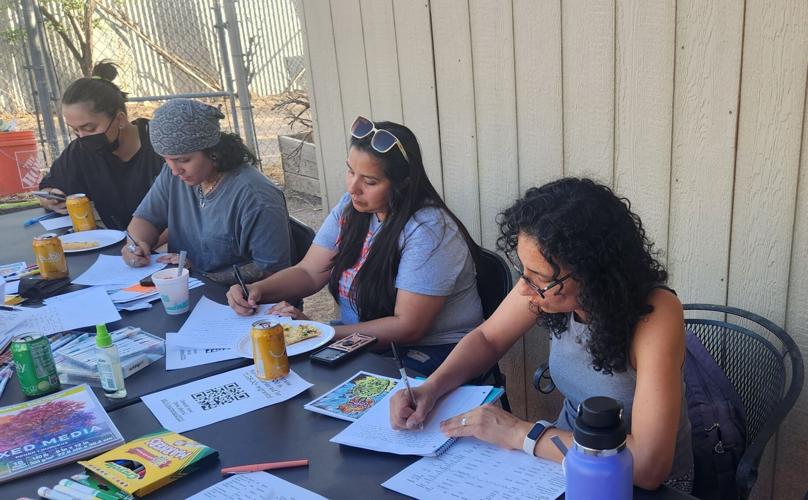
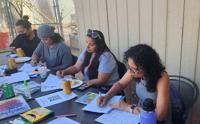

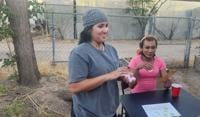



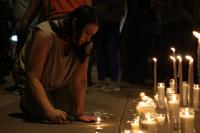

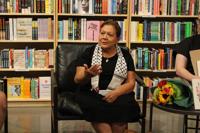



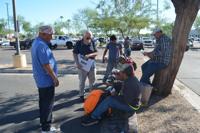




(0) comments
Welcome to the discussion.
Log In
Keep it Clean. Please avoid obscene, vulgar, lewd, racist or sexually-oriented language.
PLEASE TURN OFF YOUR CAPS LOCK.
Don't Threaten. Threats of harming another person will not be tolerated.
Be Truthful. Don't knowingly lie about anyone or anything.
Be Nice. No racism, sexism or any sort of -ism that is degrading to another person.
Be Proactive. Use the 'Report' link on each comment to let us know of abusive posts.
Share with Us. We'd love to hear eyewitness accounts, the history behind an article.